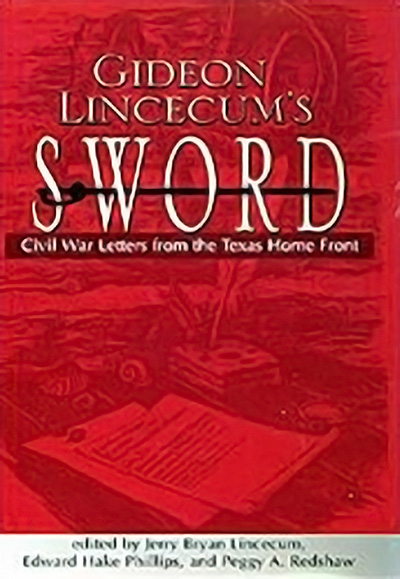
February, 2001
Published
320
Pages
1 photo. 5 illus. Bib. App. Index.
Features
Read Online
About Lincecum et al.'s Gideon Lincecum's Sword
Gideon Lincecum’s Sword: Civil War Letters from the Texas Home Front is now available as a free e-book at the UNT Digital Library.
The effects of the Civil War on civilian life in Texas are powerfully conveyed in the correspondence of Dr. Gideon Lincecum (1793-1874), a natural scientist and philosopher who moved to Texas in 1848 with his family of ten children and settled in Washington County. Having retired from an extensive and lucrative botanical medical practice in Mississippi, Gideon devoted much of his time in Texas before the war to studying the natural sciences and carrying on an extensive correspondence that included Northern scientists and even Charles Darwin. He used a letterpress to make copies of almost all of his letters, and these letterpress volumes, totaling more than a thousand pages, were preserved by one of his daughters. Gideon’s letters provide a rich and detailed account of how one individual and his large extended family, all of whom were strongly committed to the Confederacy, kept up with the progress of the conflict and coped with the multitude of problems it created.
Lincecum’s resourcefulness in the face of shortages included weaving spanish moss into blankets and investigating the papermaking potential of milkweed. He was always optimistic about the prospects of the Confederacy and always willing to further the cause however he could. His dedication to the South often led him into astonishing diatribes, as when he wrote his son Lysander: “It would be a gratifying thing to my feelings, to be certified that every man, woman and child in the bounds of the confederacy had taken a solemn oath that to die fighting is far preferable to submission, and so long as they have life and strength to damage a yankee in any manner or form that they will continue to do so.”
“The Gideon Lincecum of this book is, almost literally, a blast from the past. His voice is so powerfully direct, so angry and immediate, it seems to blow down the barricades of time itself. Lincecum reveals himself to be a deliciously complex personality: a tender-hearted pater familias, loyal friend, and courageous man of science who is also a hectoring, fulminating blowhard whose brilliant mind is clouded with bigotry. This book is so strikingly immediate and so disturbingly authentic that it should be read by anyone seriously trying to understand the tone and texture of mid-nineteenth century Texas.” —Stephen Harrigan, author of Gates of the Alamo
“This is going to be a very important book for homefront views in Texas, and at the same time a really useful insight into the ingenuity exercised by many Confederates in dealing with shortage and scarcity. Certainly Gideon was well ahead of many Southerners in calling for regional self-sufficiency.” —William C. Davis, author of Jefferson Davis and “A Government of Our Own”: The Making of the Confederacy
“Pioneer Texas scientist, natural healer and philosopher Gideon Lincecum continues to be a fascinating character full of extreme contradictions in this collection of his Civil War letters from the home front. On the one hand he was a true Renaissance man for his time, his inquiring mind never at rest. On the other he was a strong believer in the righteousness of slavery. He was virulent in his hatred of the Yankee aggressors, yet when the war was over he resumed correspondence with his Northern scientist friends almost as if nothing had happened.” —Elmer Kelton, author of The Good Old Boys and The Time It Never Rained
About the Editor
JERRY BRYAN LINCECUM is Shoap Professor of English at Austin College and the author of Gideon Lincecum’s Sword, published by UNT Press.
More from Jerry Bryan Lincecum
EDWARD HAKE PHILLIPS was Professor Emeritus of History at Austin College.
More from Edward Hake Phillips
PEGGY A. REDSHAW is Professor of Biology at Austin College. The three previously coedited Science on the Texas Frontier: Observations of Dr. Gideon Lincecum.
Buy Now
Gideon Lincecum's Sword: Civil War Letters from the Texas Home Front
320 pp. 1 photo. 5 illus. Bib. App. Index.